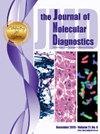Development of a Body of Knowledge for the Clinical Bioinformatician
IF 3.4
3区 医学
Q1 PATHOLOGY
引用次数: 0
Abstract
The use of next-generation sequencing and other high-throughput technologies in the clinical molecular diagnostics laboratory requires the application of bioinformatics pipelines and other computational tools to analyze, visualize, and store these clinical data. Clinical bioinformaticians, individuals with the skills to develop, validate, and deploy these tools in a clinical setting, are needed to ensure that these molecular diagnostic technologies can be appropriately used for clinical care. Building on existing expertise in informatics, next-generation sequencing, and clinical molecular diagnostics, the Association for Molecular Pathology has generated a series to establish an initial clinical bioinformatician body of knowledge. These articles cover the potential roles of the clinical bioinformatician, assist molecular laboratory and clinical bioinformatics directors in understanding the various roles of the clinical bioinformatics team members, and provide guidance regarding the competencies and skill sets required. The three articles within this Body of Knowledge cover the following knowledge cores: i) Molecular Diagnostics, ii) Clinical Bioinformatics, Software, and Database Knowledge, and iii) Clinical Laboratory Regulation and Data Security. Many of the topics covered in these articles are broad and rapidly evolving; therefore, this Association for Molecular Pathology Clinical Bioinformatician Body of Knowledge article series is designed to provide an initial framework for the core bioinformatics skills required to function successfully within a molecular diagnostic laboratory.
临床生物信息学家知识体系的发展:来自分子病理学协会临床基因组学生物信息学家知识体系指导委员会的观点。
在临床分子诊断实验室中使用下一代测序(NGS)和其他高通量技术需要应用生物信息学管道和其他计算工具来分析、可视化和存储这些临床数据。临床生物信息学家,即具备在临床环境中开发、验证和部署这些工具的技能的个人,需要确保这些分子诊断技术可以适当地用于临床护理。基于信息学、NGS和临床分子诊断方面的现有专业知识,分子病理学协会(AMP)编制了一系列文件,以建立初步的临床生物信息学知识体系。这些手稿涵盖了临床生物信息学家的潜在角色,协助分子实验室和临床生物信息学主任了解临床生物信息学团队成员的各种角色,并提供有关所需能力和技能集的指导。本知识体系中的三篇稿件涵盖了以下知识核心:(1)分子诊断,(2)临床生物信息学,软件和数据库知识,(3)临床实验室法规和数据安全。这些手稿中涵盖的许多主题是广泛和迅速发展的;因此,这个AMP临床生物信息学的知识体系手稿系列旨在提供核心生物信息学技能,在分子诊断实验室成功运作所需的初步框架。
本文章由计算机程序翻译,如有差异,请以英文原文为准。
求助全文
约1分钟内获得全文
求助全文
来源期刊
CiteScore
8.10
自引率
2.40%
发文量
143
审稿时长
43 days
期刊介绍:
The Journal of Molecular Diagnostics, the official publication of the Association for Molecular Pathology (AMP), co-owned by the American Society for Investigative Pathology (ASIP), seeks to publish high quality original papers on scientific advances in the translation and validation of molecular discoveries in medicine into the clinical diagnostic setting, and the description and application of technological advances in the field of molecular diagnostic medicine. The editors welcome for review articles that contain: novel discoveries or clinicopathologic correlations including studies in oncology, infectious diseases, inherited diseases, predisposition to disease, clinical informatics, or the description of polymorphisms linked to disease states or normal variations; the application of diagnostic methodologies in clinical trials; or the development of new or improved molecular methods which may be applied to diagnosis or monitoring of disease or disease predisposition.

 求助内容:
求助内容: 应助结果提醒方式:
应助结果提醒方式:


